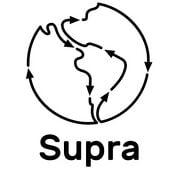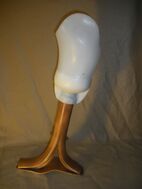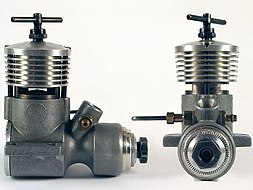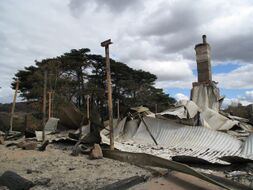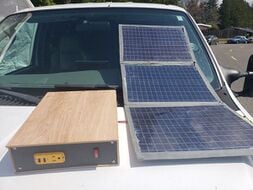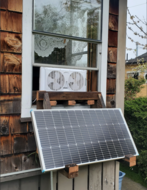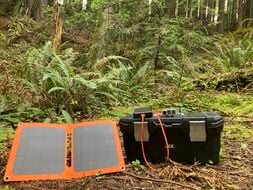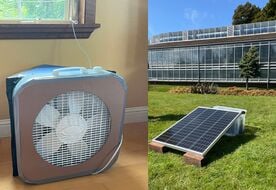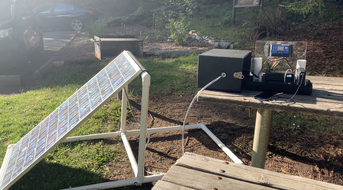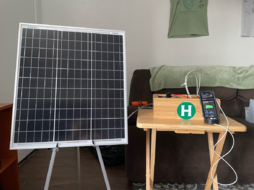No edit summary |
No edit summary |
||
| Line 93: | Line 93: | ||
}} | }} | ||
|||2| Sanding Satellite Dish | |||2| Sanding Satellite Dish | ||
{{Gallery | |||
{{Gallery | |||
| File:Photo 0.jpg | With safety attire on (dust mask) begin sanding with coarse sand paper (We started with 60 grit) | | File:Photo 0.jpg | With safety attire on (dust mask) begin sanding with coarse sand paper (We started with 60 grit) | ||
| | | File:Sanded Satellite Dish.jpg | Continue sanding with finer grades of sand paper to remove large scratches and improve overall reflection. (Our grit levels: 220-600-1500 | ||
| | | |File:Default.png | Improve the reflection of the dish even more by buffing with metal polish | ||
| | | |File:Default.png | Shiny dish! | ||
}} | }} | ||
|||3| | |||3| Focal Point | ||
{{Gallery | {{Gallery | ||
| | |File:Default.png | Using the arm that comes with the satellite dish, attached wire hanger slightly above where the focal point of the dish lies. | ||
| | | |File:Default.png | Using tin cans, drill holes near the top so that the wire hangers can attach and hold without risk of dropping. (The bottom of the tin can should be where the focal point is, adjust hangers accordingly). | ||
| | | |File:Default.png | Place wax in to melt. | ||
}} | }} | ||
|||4| | |||4| The Base | ||
{{Gallery | {{Gallery | ||
| | |File:Default.png | A recycled tire makes a great base | ||
| | | |File:Default.png | Cut slits throughout the rim of the tire (This will allow the dish to sit better in the tire) | ||
| | |File:Default.png | Place dish in and direct towards Sun | ||
}} | }} | ||
| Line 118: | Line 118: | ||
==Discussion and next steps== | ==Discussion and next steps== | ||
The overall goal was to design something that can take items out of the waste stream and transform them into an object that can do another task. Our design not only pulls common items out of the wast stream, but it puts them to work in preventing other items from entering the waste stream. | |||
As far as application goes [[SCRAP Humboldt]] has already come up with one idea: use this design to teach children the good about reuse and sustainability. | |||
==References== | ==References== | ||
See [[Help:Footnotes]] for more. | See [[Help:Footnotes]] for more. | ||
| Line 124: | Line 125: | ||
[[SCRAP Humboldt]] | [[SCRAP Humboldt]] | ||
Mary Krieger | [[User:Mary| Mary Krieger]] | ||
Jenny Kunna | [[User:Jenny| Jenny Kunna]] | ||
[[User:Josh| Josh Martinez]] | [[User:Josh| Josh Martinez]] | ||
Ky Wagner | [[User:Ky| Ky Wagner]] | ||
[[Category:Engr215 Introduction to Design]] | [[Category:Engr215 Introduction to Design]] | ||
[[Category:SCRAP Humboldt]] | [[Category:SCRAP Humboldt]] | ||
Revision as of 19:54, 18 April 2013
Abstract
The Parabolic Wax Melter utilizes 3-D printing capabilities and the energy produced from the Sun to heat and re-purpose crayons, candles, and other waxes. The wax melter is constructed out of common waste stream items and up-cycles them into a useful and interesting design whose main function is further up-cycling. This design was created in the Humboldt State University Engineering 215, for the client, SCRAP Humboldt whose goal is to “inspire creative reuse and environmentally sustainable behavior by providing educational programs and affordable materials to the community.” (SCRAP)
Background
Engineering 215 is a design class at Humboldt State University that, each semester, partners with a local community business to improve student experience and to improve the business partner. For the 2013 Spring Semester, Engineering 215 has partnered with SCRAP Humboldt, a non-profit organization that promotes creative reuse and up-cycling. What really makes the Parabolic Wax Melter different from some other designs is that it utilizes 3-D printing. Molds for crayons and candles were created using the 3-D design software, AutoCad.
Problem statement and criteria
There are to many common household items that are going in to the waste stream and no solutions that take advantage of 3-D printing.
| Criteria | Constraints | Weight (1-10) |
|---|---|---|
| Aesthetics | Does not look like trash | 7 |
| Reusability | Ability to transform waste into a solution | 9 |
| Replicability | Possible to replicate at home | 4 |
| Durability | Able to last 6 months | 1 |
| Cost | Make as least costly as possible | 8 |
| Size | Be mobile | 1 |
| Materials | Greater then 75% recycled | 10 |
Description of final project
The parabolic wax melter encourages reuse of crayons, candles, and other waxes. The parabolic wax melter pulls common items out of the waste stream and continues to utilizes their designed/natural properties. The main component of the design is the satellite dish which focuses the energy from the Sun to a focal point where the heat can melt and restructure crayons. The 3-D molds are designed to be unique and resemble local themes.
Costs
Use Help:Table_examples#Cost_Table.
| Material | Retail Cost ($) | Our Cost ($) | Total (Retail) | Total (Ours) |
|---|---|---|---|---|
| Satellite Dish | 100.00 | 0.00 | 100.00 | 0.00 |
| Sand Paper | 3.22 | 3.22 | 103.22 | 3.22 |
| Total Cost | $3.22 | |||
Testing Results
enter results and photos
How to build
Discussion and next steps
The overall goal was to design something that can take items out of the waste stream and transform them into an object that can do another task. Our design not only pulls common items out of the wast stream, but it puts them to work in preventing other items from entering the waste stream. As far as application goes SCRAP Humboldt has already come up with one idea: use this design to teach children the good about reuse and sustainability.
References
See Help:Footnotes for more. Template:Reflist SCRAP Humboldt


